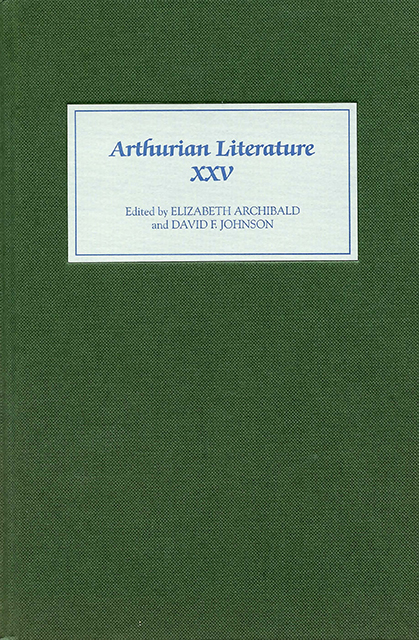Book contents
- Frontmatter
- Contents
- Illustrations
- Foreword
- Contributors
- Abbreviations
- I Geoffrey of Monmouth and the Merlin Legend
- II The Enchantress, The Knight and the Cleric: Authorial Surrogates in Arthurian Romance
- III ‘Morgan Le Fay, Empress of the Wilderness’: A Newly Recovered Arthurian Text in London, Bl Royal 12.C.IX
- IV Malory's Lancelot and the Key to Salvation
- V Chrétien in Ivory
- VI ‘An Empire of Itself’: Arthur as Icon of an English Empire, 1509–1547
III - ‘Morgan Le Fay, Empress of the Wilderness’: A Newly Recovered Arthurian Text in London, Bl Royal 12.C.IX
Published online by Cambridge University Press: 10 March 2023
- Frontmatter
- Contents
- Illustrations
- Foreword
- Contributors
- Abbreviations
- I Geoffrey of Monmouth and the Merlin Legend
- II The Enchantress, The Knight and the Cleric: Authorial Surrogates in Arthurian Romance
- III ‘Morgan Le Fay, Empress of the Wilderness’: A Newly Recovered Arthurian Text in London, Bl Royal 12.C.IX
- IV Malory's Lancelot and the Key to Salvation
- V Chrétien in Ivory
- VI ‘An Empire of Itself’: Arthur as Icon of an English Empire, 1509–1547
Summary
London, British Library MS Royal 12.C.ix is a collection of astronomical treatises and tables copied in the thirteenth and fourteenth centuries. The provenance of the manuscript before it belonged to John, Lord Lumley (1534?–1603), whose ex libris is on folio 1, is unknown. Like many medieval books, Royal 12.C.ix contains notes by various hands written both in ink and in plummet (lead) on the flyleaves, spare folios, and blank spaces of the manuscript. Except for one note to be discussed momentarily, the notes are in Latin. At least one writer in this manuscript is responsible for astronomical and astrological notes on several folios. The hands of the notes and the dates mentioned in them fall within the first half of the fourteenth century. The presence of several hands in the notes suggests that the manuscript passed through several owners in the fourteenth century, although it is also possible that variations among the annotators’ hands are due to changes in the handwriting of only one or two annotators. A few of these notes will be discussed as they become relevant later in this essay.
One note stands out as the only note in the manuscript that is written in a vernacular language: a letter in Anglo-Norman French purportedly by Morgan le Fay, written in ink, that straddles the bottom of folios 165v and 166r below a set of lunar tables. It is one of the few medieval Arthurian texts in which Morgan speaks in her own voice, and it is the only example in medieval Arthurian literature of a text presented as being composed by Morgan. As the Morgan letter is noted neither in the standard Arthurian bibliographies nor in the handlist of Anglo-Norman French texts by Dean and Boulton, there is good reason to assume that it is unknown to Arthurian scholars. The two insertions on folio 166r suggest that the scribe copied from an exemplar and corrected himself. The beginning of the letter on folio 165v follows five lines of other notes in plummet that were either rubbed out or were written very faintly to begin with, as only a few traces of them are now visible.
- Type
- Chapter
- Information
- Arthurian Literature XXV , pp. 67 - 92Publisher: Boydell & BrewerPrint publication year: 2008



